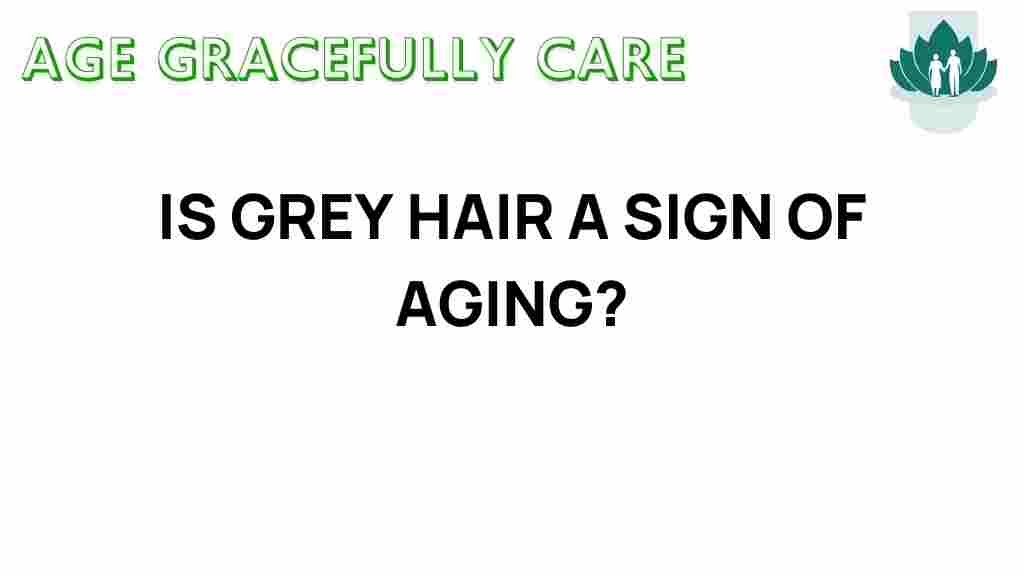Is Grey Hair a Sign of Aging?
Grey hair has long been associated with aging, but the relationship between grey hair and aging is not as straightforward as many believe. While it is true that many older adults experience grey hair, several factors contribute to this phenomenon, including genetics, health, and lifestyle choices. In this article, we will explore the myths and facts surrounding grey hair, its connection to aging, and what you can do to maintain your hair’s beauty and wellness as you age.
The Science Behind Grey Hair
To understand grey hair, we must first delve into the science of hair pigmentation. Hair color is determined by the presence of melanin, a pigment produced by melanocytes in the hair follicles. As we age, these melanocytes gradually produce less melanin, leading to the appearance of grey or white hair. Here are some key points to consider:
- Melanin Production: The decrease in melanin production is a natural part of the aging process.
- Genetics: Your genetic makeup plays a significant role in when you start to go grey.
- Health Factors: Certain health conditions can influence the onset of grey hair.
Myths About Grey Hair and Aging
Many myths surrounding grey hair contribute to misconceptions about aging. Here are some common myths debunked:
- Myth 1: Stress Causes Grey Hair: While stress can impact your overall health, there is insufficient evidence linking stress directly to grey hair.
- Myth 2: Pulling Out Grey Hair Causes More to Grow: This is a classic myth. Pulling out a grey hair does not cause more to grow; it simply leaves a gap in your hairline until the hair regrows.
- Myth 3: Grey Hair is Unhealthy: Grey hair itself is not a sign of poor health, but it can be an indicator of other health issues in some cases.
Genetics and Grey Hair
One of the most significant factors influencing when and how much grey hair you experience is genetics. Research shows that if your parents went grey early, there’s a good chance you might too. Here are some genetic factors to consider:
- Family History: If you have a family history of early greying, you are more likely to experience the same.
- Ethnic Background: Different ethnic groups experience grey hair at varying ages. For example, Caucasians may start to grey in their mid-30s, while African Americans may not see significant greying until their 40s.
Health and Grey Hair
Your overall health can also influence your hair color. Certain health conditions and lifestyle factors may accelerate the greying process:
- Vitamin Deficiencies: Deficiencies in vitamins B12, D3, and E can contribute to premature greying.
- Thyroid Issues: An underactive or overactive thyroid can affect hair pigmentation.
- Autoimmune Diseases: Conditions such as vitiligo can cause loss of pigmentation in hair.
Beauty and Wellness: Maintaining Your Hair
As you navigate the changes that come with aging, maintaining the beauty and health of your hair becomes essential. Here are some tips:
- Healthy Diet: Incorporate foods rich in vitamins and minerals, such as leafy greens, eggs, nuts, and fish.
- Hydration: Drink plenty of water to keep your hair and scalp hydrated.
- Regular Scalp Care: Use gentle shampoos and conditioners that nourish your hair.
- Limit Heat Styling: Reduce the use of heat styling tools to prevent damage.
Step-by-Step Guide to Embracing Grey Hair
Embracing your grey hair can be a beautiful journey. Here’s a step-by-step guide to help you along the way:
- Assess Your Hair: Determine the extent of your grey and decide whether you want to transition fully or maintain some color.
- Choose Products Wisely: Invest in shampoos and conditioners designed for grey hair to enhance shine and manageability.
- Consult a Professional: If you’re unsure how to proceed, consider consulting a hairstylist for advice on transitioning to grey.
- Experiment with Styles: Try different hairstyles that complement your grey hair and embrace its uniqueness.
- Confidence is Key: Wear your grey hair with confidence; it can be a stunning feature that enhances your beauty.
Troubleshooting Common Concerns
As you transition to grey hair, you may encounter some challenges. Here are some common concerns and how to address them:
- Concern: Yellowing of Grey Hair
Solution: Use purple shampoo to neutralize yellow tones and maintain the brightness of your grey hair. - Concern: Dryness and Frizz
Solution: Regularly use moisturizing treatments and oils to keep your hair hydrated and manageable. - Concern: Lack of Shine
Solution: Consider using shine-enhancing serums or sprays to give your grey hair a healthy glow.
Conclusion: Embracing Grey Hair with Confidence
In conclusion, while grey hair is often seen as a sign of aging, it is a natural part of life influenced by various factors such as genetics, health, and lifestyle. Understanding the myths and facts about grey hair can empower you to embrace this change with confidence. By focusing on beauty and wellness, you can maintain the health of your hair and celebrate your unique journey. Remember, grey hair can be a symbol of wisdom and experience, adding to your beauty rather than detracting from it.
For more information on hair care and wellness, check out this helpful resource.
For a deeper understanding of genetics and hair color, visit this external link.
This article is in the category Wellness and created by AgeGracefullyCare Team
